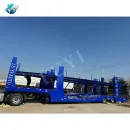How do you use a Car Carrier Semi Trailer?
Using a car carrier semi-trailer involves several steps to ensure safe loading, transportation, and unloading of vehicles. Here's a detailed guide on how to use a car carrier semi-trailer effectively.
1. Pre-Trip Inspection
Before loading any vehicles onto the semi-trailer, conduct a thorough pre-trip inspection to ensure that the trailer is in good condition and safe to use. Check the tires, brakes, lights, suspension, and coupling mechanisms to identify any issues that need to be addressed before loading.
2. Secure Loading Area
Choose a level and stable surface for loading and unloading vehicles onto the semi-trailer. Ensure that there is enough space around the trailer to maneuver vehicles safely and that there are no obstacles or hazards in the vicinity.
3. Positioning the Semi-Trailer
Park the auto transport semi trailer in a suitable position for loading and unloading, making sure that it is aligned with the loading ramp or dock. Use wheel chocks to prevent the trailer from moving during the loading process.
4. Loading Vehicles
Carefully drive or tow the vehicles onto the semi-trailer, positioning them in the designated slots or compartments according to their size and weight distribution. Use ramps or hydraulic lift systems to facilitate loading and ensure a smooth transition onto the trailer.

5. Securing Vehicles
Once the vehicles are positioned on the semi-trailer, secure them in place using straps, chains, or wheel immobilizers. Ensure that each vehicle is firmly anchored to the trailer to prevent shifting or movement during transportation.
Explore more:
A Comprehensive Guide on Choosing the Right Trailer Suspension
Self propelled modular transporter - SPMT
What is Low Bed Trailer and Why Do We Use Them?
What is the point of a spread axle trailer?
Lowboy/Low bed trailer buying guide: How to Choose ...
5 Things to Know Before Buying low bed semi trailers
10 Out-of-the-Box Benefits of Shipping Containers for ...
6. Check Weight Distribution
Verify that the weight of the loaded vehicles is evenly distributed across the Car transport Trailer to maintain stability and balance during transit. Adjust the positioning of vehicles if necessary to achieve proper weight distribution.
7. Perform Safety Checks
Before hitting the road, perform a final safety check to confirm that all vehicles are securely fastened, lights and brakes are working properly, and the trailer is in compliance with all regulatory requirements.
8. Driving and Maneuvering
Operate the semi-trailer cautiously, especially when navigating turns, ramps, and inclines. Maintain a safe distance from other vehicles and adhere to speed limits and traffic regulations at all times.
9. Unloading Vehicles
Upon reaching the destination, park the semi-trailer in a safe and accessible area for unloading. Remove securing devices and carefully drive or tow the vehicles off the trailer, taking care to avoid damage or accidents.
10. Post-Trip Inspection
After unloading all vehicles, conduct a post-trip inspection to assess the condition of the semi-trailer and address any maintenance or repair needs before the next use.
In summary, using a car carrier semi-trailer involves careful planning, preparation, and execution to ensure safe and efficient transportation of vehicles. By following these steps and adhering to best practices, drivers can effectively utilize car carrier semi-trailers for a variety of transportation needs.
Is it better to buy OEM brake pads?
Revolutionizing LPG Storage: Single-Layer Tanks Explained
The Ultimate Guide to Single-Layer LPG Storage
Where are brakes located in a car?
LNG Cylinder: Unveiling the Ultimate Guide to Safely Storing & Transporting Liquefied Natural Gas
Are electric forklifts worth it?
Which Car Rotors Reign Supreme in Performance?










